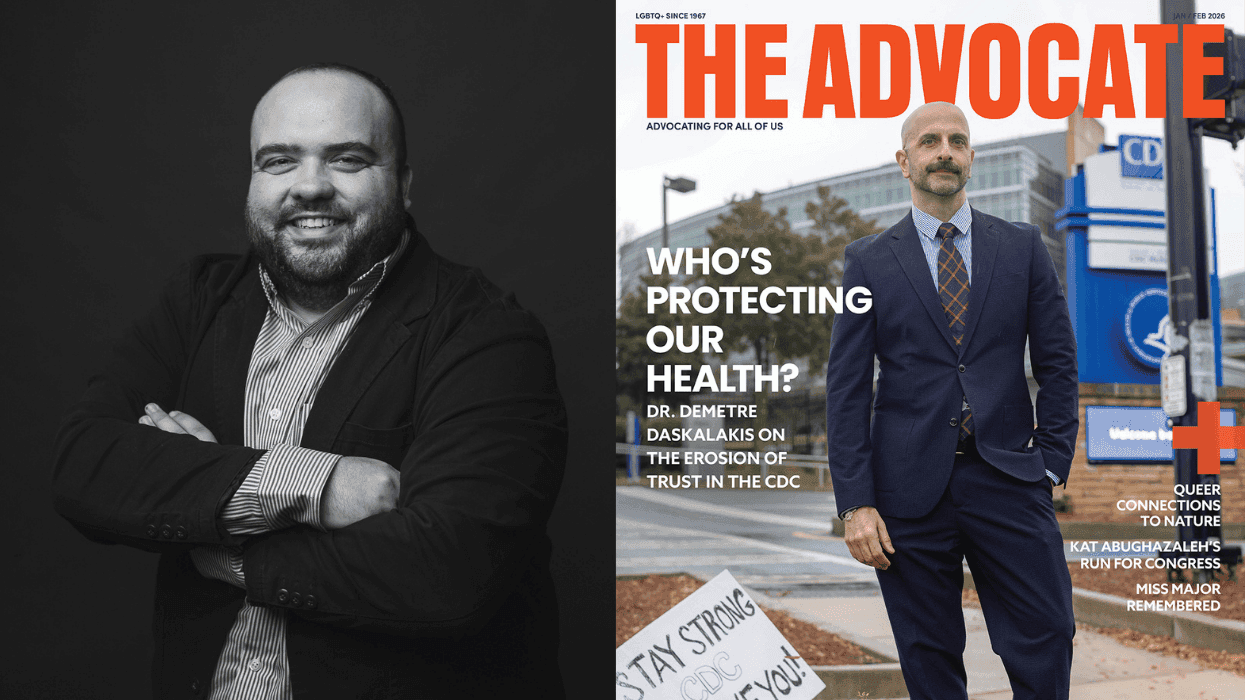On the latest episode of The Advocates podcast, the show dedicated to LGBTQ issues across generations, singer-songwriter Mary Lambert, who rose to fame with her song "She Keeps Me Warm" on Macklemore and Ryan Lewis's "Same Love," joins host Tracy E. Gilchrist and guest host Daniel Reynolds to discuss her upcoming book of poetry, Shame Is an Ocean I Swim Across. Lambert also offers thoughts about the midterm election, reads one of her poems aloud, and sings a snippet of one of her all-time favorite songs from a musical! She offers up a lot of love and good vibes as well.
To open the show, Gilchrist and regular cohost Jessie Earl break down the rainbow wave of LGBTQ people elected during the midterms, the horrific shooting in Thousand Oaks, Calif., and Donald Trump's inability to show empathy for the victims of the apocalyptic California wildfires. For homework, the two cohosts discuss Supergirl and the introduction of the world's first live-action transgender superhero.
Read highlights from the interview here, or listen to the full podcast interview on the audio player below.
The Advocates podcast is a biweekly series from the world's most influential LGBTQ magazine, where hosts Jessie "Gender" Earl and Tracy E. Gilchrist break down the biggest stories in queer news, along with numerous LGBTQ guests. Don't miss a single episode by subscribing on iTunes, Soundcloud, or Google Play.
Tracy E. Gilchrist: How did you come across the title [of your poetry book]?
Mary Lambert: It's a line in one of the poems called the "Art of Shame," and I loved my own line so much that originally I wanted it to be an album title, but when I got this book deal it was sort of a stand-in title. My publisher was like, "No, we really like that," and I was like, "Well, they're paying me, so I can put that title on there." But I think it's sort of a good thesis statement for the rest of the book. So much of the different traumas and aspects of my identities that I have contended with over the course of my life have materialized in shame and physically carrying pits of shame in my stomach and feeling really anxious and feeling bad.
I know the importance of ridding yourself of shame because the joy that I feel now from this uninhibited, glorious sunshine all the time, and obviously, I'm always processing stuff, but the difference of how I used to feel about my body, my identity, my sexuality, my trauma, my mental illness from now versus 10 years ago is so drastically different. I figured out that it festered that way because of shame. Shame was at the root of all those things, whether it was body shame or shame from the church. I felt like that was sort of the overall theme -- that my desire to put these things out in the world is to do sort of a shame wash. How do we rid ourselves of shame? This is sort of an exploration in that, and it is dark. I am talking very explicitly about trauma for part of the time. I feel like I'm a walking trigger warning. But it is important to be vocal and visible about our narratives because there is an urgency to be authentic and genuine and telling the truth, however indigestible it might be.
I feel like there's an impetus or a desire to put different aspects or stories of ourselves into boxes or make them canned -- to fit other people's perceptions so they can digest it. It's really important to say that some of it's nuanced and complicated, and we're all complex and we're many things at once. It's OK if we're not understood at once. This book is sort of an incarnation of all those things.
Daniel Reynolds: How do you "swim across shame"?
If I can talk about different tools that I've used, because I feel that oftentimes when we talk to figures, people on platforms, there's this desire to make something that sort of feels like a good sound bite and we're like a meme like, " Oh, I love myself and my body? Cool!" If I could do that I would've done that. But it takes hard work and we talk about self-care in this way that's like going to the spa, but oftentimes it means confronting things that are so uncomfortable and that don't feel good. Sometimes self-care isn't pretty or comfortable.
The initial step [in moving through shame] is knowing that you can feel differently and knowing that you can feel stuck in a cycle. I think the big thing when I started ridding myself of shame -- the first thing ... I think I was in college when I was 19 or 20. I experienced a lot of child abuse growing up and it has resulted in me being really absent-minded and forgetful. I'm the person that leaves my house and goes back in five minutes because I forgot something.
Gilchrist: That's part and parcel of compartmentalizing.
I used to have a lot of shame about that because I'd be like, God, just stop forgetting things. Just figure it out.
When I was in college I locked my keys in my car all the time and I'd have to call AAA to have them open my car up. In one month I used all of my mom's AAA calls. I should have done something else, but I just kept doing it and I didn't have any money, so I opened a credit card specifically for AAA to open my car because, I would say, this happened six or seven times a month. I was 19 and I had maxed out a credit card just for people to break into my car to get my keys out. I think it was because I kept being angry with myself and kept saying, "Just figure it out. You have to be a functioning person in this world and this is what functional people do. Stop locking your keys in the car."
I kept punishing myself and I was like, Oh, my God. Now I have credit card debt and I hate my brain and I hate myself.
So I had this flip where I said I'm going to start making provisions in my life that embrace my forgetfulness and just sort of set things up that I know I'm going to forget things. I made four copies of my car keys. I gave one to my mom, I gave one to my roommate, I hid one in my college. It's probably still there. I forgot. And I had an extra in my purse. I swear I haven't locked my keys in my car since.
Once I figured out that it was OK to be forgetful, that there is nothing inherently bad in being forgetful, and the same thing goes with it's not inherently bad to be a fat person. ... There are all these social scary norms that make us feel stigmatized and are stigmatizing, but I started analyzing my own thought pattern and brain and where chemicals were sent to my body when things happen so I felt more in control. If I had an uncomfortable or bad exchange with somebody and I felt the shame creeping, I couldn't stop it, but I could at least understand, OK, my brain is releasing this chemical I'm feeling in my solar plexus. What are some breathing exercises I can do to calm myself down and just monitor that self-talk so that slowly over time that rewiring starts to happen?















